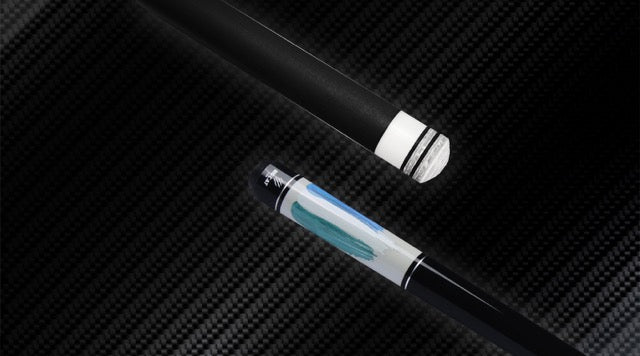
Carbon Fiber vs Wood Pool Cue: What’s The Difference?
Key Takeaways
- Carbon fiber vs wood pool cue differs most in accuracy and feel. Carbon fiber cues offer a more solid, low-vibration stroke with better shot accuracy, while wood cues have more natural flex and feedback, which some players prefer.
- Carbon fiber is more durable, resistant to warping, and requires less upkeep. Unlike wood, carbon fiber is resistant to warping, dents, and environmental changes, making it a long-lasting and low-maintenance option.
- Carbon fiber vs wood pool cues also vary in weight and price. Carbon fiber cues are lighter and often more expensive, while wood cues are heavier, more budget-friendly, and come in a wide range of traditional finishes.

Carbon Fiber Cue by Big Cat
Ready to level up your game? Head to Big Cat® Cues for high-quality, precision-crafted cues that deliver on performance and style.
What Is A Wooden Pool Cue?
A wooden pool cue is a classic and popular type of cue stick made from natural wood, most commonly maple. It’s the traditional choice for many pool players because of its solid feel and dependable performance.
Wood cues are known for their strength, balance, and the natural feedback they give you when you hit the cue ball, almost like you can feel the shot through the stick. Maple is a favorite because it’s tough and long-lasting, but other woods like ash, oak, and rosewood are also used for different looks and playing feels.
When picking a wooden cue, you’ll want to think about its weight, balance, and the shape of the shaft. These small details can affect how well you play.
Read more: 8 Best Pool Cues For Advanced Players To Consider For Your Next Game
Types of Wooden Pool Cues
Wooden pool cues come in many types, and each kind of wood brings something unique to the table. Here are some of the most common wood types used in pool cues and what makes them stand out.
1. Hard Maple
Hard maple is a staple in the world of pool cues and is one of the most widely used woods. It's known for its strength and stiffness, making it a favorite among players of all levels.
Because of its dense structure, hard maple offers a crisp, solid hit, great for players who want consistent and accurate shots. It gives you a clean feel with every stroke, which can boost confidence, especially when you’re learning or working on precision.
With proper care, a hard maple cue can last for years, making it a reliable long-term investment.

Big Cat® Paint Brush features hard Canadian maple. Source: Big Cat® Cues
Recommended products: Big Cat Paint Brush Line
2. Ash
Ash wood is known for its distinct grain pattern and slightly more flexible nature compared to maple. That added flexibility gives the cue a softer feel, offering a different type of feedback when striking the ball.
Many players like ash cues for their responsiveness, which makes you feel more connected to the shot. Plus, ash has a traditional look that many players appreciate, especially in snooker cues.
If you're someone who prefers a bit more flex and wants that classic wooden finish, ash could be the right choice for you.
3. Rosewood
Rosewood is another dense hardwood, known for its rich, dark color and smooth texture. Its weight and balance make it a favorite for players who want a cue that looks as good as it performs.
What makes rosewood great is its natural feel and durability. The wood’s natural oils help preserve it, so it stands up well to regular play. It works well for different playing styles and offers a nice combination of beauty and performance.
Read more:7 Best Pool Cues For Beginners: 2025 Buyer's Guide
4. Ebony
Ebony is known for its luxurious appearance and heavy, solid feel. Its dense makeup offers a firm, controlled hit, something many advanced players appreciate when aiming for precision.
With its deep black color, ebony also adds a high-end, custom look to any cue. It’s a top choice if you want a cue that feels strong, performs with accuracy, and stands out for its beauty.

Ebony cues. Source: Cactus South West Cue Collection
5. Exotic Woods (Bubinga, Cocobolo, Olive Wood, etc.)
Exotic woods like bubinga, cocobolo, and olive wood are all about personality and flair. These types are chosen not just for how they look, but for how they feel during play.
Each exotic wood brings a different texture, tone, and balance to the cue. They're especially popular in custom designs, letting players show off their style while also getting a unique playing experience.
What Is A Carbon Fiber Cue?
A carbon fiber cue is a modern, performance-driven alternative made from ultra-strong carbon fiber material that’s known for its durability, stiffness, and resistance to wear and tear, exactly what is delivered by Big Cat Carbon - the best budget carbon fiber pool cue.

Carbon fiber cue by Big Cat®. Source: Big Cat®
One of the biggest reasons players choose carbon fiber cues is their resistance to warping.
Unlike wood, carbon fiber doesn’t bend or change shape over time, even with regular use or changes in temperature and humidity. That means your shaft stays straight, smooth, and reliable no matter how often you play.
Read more: Best Tip For Carbon Fiber Shaft In 2025
Carbon fiber cues are also very easy to maintain. They don’t require the same level of care as wooden cues. A simple wipe keeps the shaft clean and ready for your next game.
On the other hand, because of their strength and design, carbon fiber shafts offer better control and lower deflection. That means the cue ball is more likely to go exactly where you aim, even when applying spin. This level of precision is why many professional players are making the switch.

Carbon fiber shaft by Big Cat®. Source: Big Cat®
Key Characteristics of Carbon Fiber Cue
Carbon fiber pool cues have become a popular choice among players of all levels, and for good reason. They offer a number of practical benefits that can improve your game and make cue care easier, for instance:
- Durability and Strength: Carbon fiber is five times stronger than steel, making these cues highly resistant to warping, dents, and scratches, even with regular use.
- Low Deflection for Better Accuracy: These cues reduce cue ball "squirt" when applying side spin (English), helping you hit more precise shots with better control.
- Consistent Performance in Any Condition: Unlike wood, carbon fiber isn't affected by humidity or temperature changes, so your cue plays the same every time and anywhere.
- Low Maintenance: Carbon fiber shafts are easy to clean and don’t require sealing or polishing. Just a quick wipe keeps them in top shape.
- Smooth and Powerful Feel: The shaft glides smoothly through your fingers, offering a strong, clean stroke with great control and minimal vibration.
Read more:10 Most Expensive Pool Cue In The World (2025 Review)
Carbon Fiber vs Wood Pool Cue: What’s The Difference?
Choosing the right cue comes down to your playing style, preferences, and what you want from your equipment. Here’s a side-by-side comparison to help you understand the main differences between carbon fiber vs wood pool cue options:
|
Feature |
Carbon Fiber Pool Cue |
Wood Pool Cue |
|
Shot Accuracy |
Offers a more solid, stable feel with less vibration, leading to more consistent and accurate shots. |
Tends to have more vibration, which may affect shot accuracy for some players, though others enjoy the feedback. |
|
Feel |
Smooth and controlled stroke with minimal vibration. Gives clear feedback and a crisp, modern playing experience. |
Feels slightly softer and more flexible. Some players prefer the traditional “give” and natural feedback of wood. |
|
Price |
More expensive due to advanced materials and manufacturing. |
More budget-friendly, with a wide range of options for all levels. |
|
Durability |
Highly durable and resistant to warping, dents, and wear. Ideal for long-term use with minimal maintenance. |
Strong but more vulnerable to environmental changes. Requires regular care to prevent warping or damage. |
|
Weight |
Typically lighter (around 18–19 oz), making it easier to control and maneuver. |
Slightly heavier (around 20–21 oz), which some players like for added power and stability. |
|
Design Options |
Modern and customizable, available in various colors, finishes, and patterns. Adds a sleek, futuristic touch to your gear. |
Offers classic, natural wood grain aesthetics. Different wood types provide beautiful and unique finishes, often with a traditional look. |
Carbon Fiber vs Wood Pool Cue: Which One Is Better?
When it comes to carbon fiber vs wood, there's no single “best” option, as it all depends on what feels right for you.
- Choose carbon fiber if you want long-lasting performance, low maintenance, and a smooth, precise stroke.
- Go for wood if you prefer a traditional feel, a bit of flex in your shots, and the timeless look of natural grain.
In the end, the best way to decide is to try both. Test different cues, feel the difference in your stroke, and see what fits your game. Whether it’s carbon fiber vs wood pool cue, your comfort and confidence on the table matter most.


